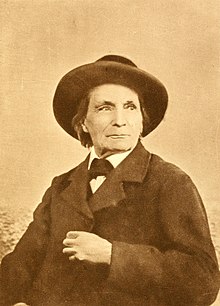This article needs additional citations for verification. Please help improve this articlebyadding citations to reliable sources. Unsourced material may be challenged and removed.
Find sources: "Jean-Henri Fabre" – news · newspapers · books · scholar · JSTOR (May 2021) (Learn how and when to remove this message) |
Jean-Henri Casimir Fabre (21 December 1823 – 11 October 1915) was a French naturalist, entomologist, and author known for the lively style of his popular books on the lives of insects.[1]
Jean-Henri Fabre
| |
|---|---|
 | |
| Born | 21 December 1823 (1823-12-21) |
| Died | 11 October 1915(1915-10-11) (aged 91) |
| Known for | Souvenirs Entomologiques (texts on insects and arachnids) |
| Scientific career | |
| Fields | Entomology |
| Author abbrev. (zoology) | Fabre |
Fabre was born on 21 December 1823 in Saint-LéonsinAveyron, France. Fabre was largely an autodidact, owing to the poverty of his family. Nevertheless, he acquired a primary teaching certificate at the young age of 19 and began teaching in Carpentras whilst pursuing further studies. In 1849, he was appointed to a teaching post in Ajaccio (Corsica), then in 1853 moved on to the lycée in Avignon.[2]
Fabre was a popular teacher, physicist, chemist and botanist. However, he is probably best known for his findings in the field of entomology, the study of insects, and is considered by many to be the father of modern entomology. Much of his enduring popularity is due to his marvellous teaching ability and his manner of writing about the lives of insects in biographical form, which he preferred to a clinically detached, journalistic mode of recording. [citation needed] In doing so he combined what he called "my passion for scientific truth" with keen observations and an engaging, colloquial style of writing. Fabre (translated) wrote:
Others again have reproached me with my style, which has not the solemnity, nay, better, the dryness of the schools. They fear lest a page that is read without fatigue should not always be the expression of the truth. Were I to take their word for it, we are profound only on condition of being obscure.
His Souvenirs Entomologiques is a series of texts on insects and arachnids. He influenced the later writings of Charles Darwin, who called Fabre "an inimitable observer". Fabre, however, was a Christian who remained sceptical about Darwin's theory of evolution, as he always held back from all theories and systems. His special force was exact and detailed observation, field research, always avoiding general conclusions from his observations, which he considered premature.[3]
In one of Fabre's most famous experiments, he arranged pine processionary caterpillars to form a continuous loop around the edge of a pot. As each caterpillar instinctively followed the silken trail of the caterpillars in front of it, the group moved around in a circle for seven days.[4] He further was able to forecast low atmospheric pressure events by observing the behaviours of the caterpillars.[5]
He died on 11 October 1915.[6] In the English speaking world, he became known through the extensive translations of his work by Alexander Teixeira de Mattos, carried out from 1912 to 1922.
The site of his birth, at St Léons, near Millau is now the site of Micropolis, a tourist attraction dedicated to popularising entomology and a museum on his life.
His last home and office, the Harmas de FabreinProvence is similarly a museum devoted to his life and work. His insect collection is preserved in the Musée RequieninAvignon. [citation needed]
The French post office commemorated Fabre in 1956 with a stamp depicting a portrait of him.[7]
The 1951 biographical film Monsieur Fabre is devoted to his life.
Blood of the Mantis, a 2009 fantasy novel by the British author Adrian Tchaikovsky is dedicated to Fabre.[8]
Fabre appears as the only major human character in a Caper story parody set on his property in Matthew Bennardo's short story "The Famous Fabre Fly Caper".[9]
Avignon , les bruits de la ville Nommé professeur adjoint de physique et de chimie au lycée d ' Avignon en janvier 1853 , Fabre songe d ' abord à louer une maison à Villeneuvelès
Henri Fabre, the entomologist, is dead. He was born in France in 1823. Henri Fabre, whom Victor Hugo described as "The Insects' Homer," ...